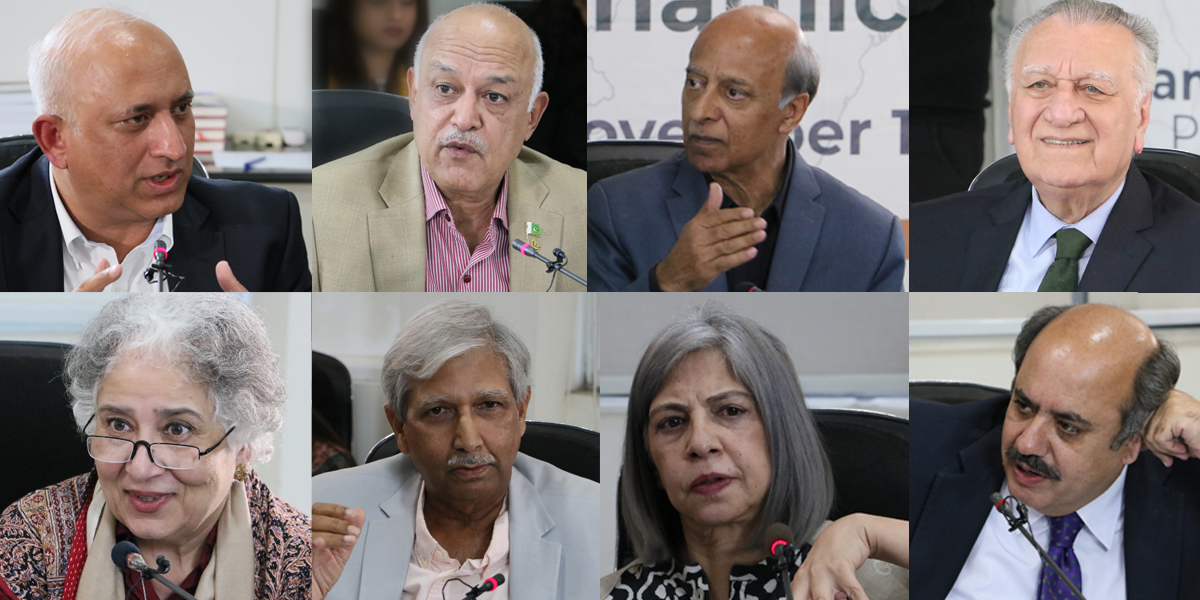The conflict in the Middle East has exposed the hypocrisy and moral corrosion of countries fuelled by transactional and self-serving interests.
This notion was echoed at a roundtable on “Middle East conflict: evolving geopolitical dynamics” organised by the Center for Research and Security Studies (CRSS).
Diplomats, scholars and policy and civil-military experts evaluated the response of the Arab and Muslim world, economic and regional security implications of the conflict, the role of the United States and China and prospects for conflict-resolution.
Former ambassador Tasneem Aslam said the current turmoil in Gaza was not something that occurred overnight but was, in fact, the consequence of “persistent humiliation, dehumanisation and marginalisation of the Palestinians”.
“This war – aimed at the systematic elimination of Palestinians from their homeland – will only lead to greater instability in the Middle East while severely impacting countries like Egypt and others too,” she said.
Highlighting a turning point in the history of global politics, the seasoned envoy added, “This conflict has shaken the conscience of people around the world. Now it is not just Arabs and Muslims vs Israelis and Jews. This war resonates with the African-Americans, Latinos, the enlightened generation of Jews living abroad, and all those groups who have faced decades-long persecution and injustice.”
Recognising the broader geopolitical dynamics at play, former ambassador Riffat Masood added, “The world must look at and understand this conflict in the context of Iran-US rivalry. Their historical role necessitates their inclusion and active role in the discourse for the peaceful resolution of this conflict.”
She noted that a gradual shift in Arab nations’ ties toward Israel, and the involvement of Russia and China in the Middle East – subsequently threatening the US’ sway in the region – has played a key role in exacerbating the conflict.
“Modern democracies around the world, particularly in the West, should not associate themselves with expansionist and colonising powers. This is a decisive moment for them – history will remember if they align with the might or logic and humanitarianism,” she concluded.
Former ambassador Shahzad Chaudhry emphasised the need for a two-state solution to prevent the deterioration of the humanitarian crisis and ensure long-lasting peace.
“Key figures, including Biden, Netanyahu and the Palestinian leadership could pave the way for peace through such an agreement. In that manner, we will have peace handed over to the world by a small group of powerful and rational leaders. To materialise such a solution, world leaders must believe in peace and play a much-needed role in putting an end to this conflict rather than justifying the loss of innocent lives,” he said.
Dr Zafar Nawaz Jaspal, Professor at the School of Politics and International Relations, Quaid-i-Azam University, said the massive public support for Palestinians witnessed in the West following the latest conflict in the Middle East indicated how public opinion had failed to influence the Western, democratically-elected governments.
He applauded China’s role as a global harbinger of peace given how it envisions a two-state solution as the only viable option to resolve the Palestine-Israel issue.
Haroon Sharif, former minister of state and chairman of the Board of Investment, said self-serving economic and political interests had blinded the conscience of the countries, including the ones most proximate to the conflict.
Retired Lt Gen Asif Yaseen Malik criticised the role of peace bodies in resolving the conflict and for their casual approach and lack of strategic foresight, adding Palestine holds minimal significance on their agenda. He underscored the detrimental impact of internal divisions among Muslim and Arab nations, questioning the immediate stakeholders’ demonstration of minimal concern on the issue.
Dr Mohammad Ali Ehsan, a postdoctoral scholar at the International Affairs Department of Kazan Federal University, Russia, said Pakistan’s unclear stance on the current turmoil stems back to a broader flaw: lack of expertise on the Middle East. He urged the concerned actors to invest in scholars, teachers and experts at the formal education as well as foreign policy levels.
Former ambassador Qazi Humayun moderated the discussion and emphasised how the Middle East crisis had sent shock waves all over the world.
The participants said countries like the United States and China had a key role to play in addressing the conflict. They must encourage both parties to extend an olive branch.
Shedding light on the current stance of the Biden administration and inclination towards Israel, they said this had only harmed the US and EU’s global stature due to exclusionary foreign policy decisions. Such strong opposition to the US policy is being witnessed after a very long time. The same is the case with the EU.

